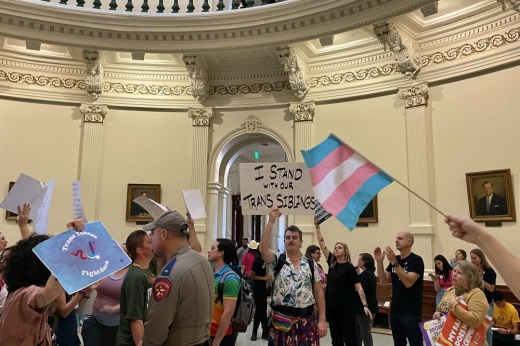The families, alongside three physicians and two LGBTQ+ organizations, filed suit in the Travis County District Court on July 12. The lawsuit challenges Senate Bill 14, arguing that the legislation discriminates against transgender children by denying them treatments that nontransgender youth could still access.
SB 14 is scheduled to become law Sept. 1, but the families’ lawyers said they hoped the court would temporarily block the law.
“Other bans on medical care for gender dysphoria have been held unconstitutional across the country,” said Harper Seldin, an attorney for the ACLU LGBTQ & HIV Project. “We are calling on this court, like other courts, to come to the same conclusion.”
The families, which include transgender children between 9 and 16 years old, are identified in the suit by pseudonyms to protect their identities. Some of the families said they were considering or planning to leave Texas if the law goes into effect.
Mary Moe said she was moving out of the state with her two children to ensure her 9-year-old daughter, Maeve, who is transgender, has access to puberty blockers. Moe’s husband will stay in Texas for work.
“We all intend to return and reunite in our home once it is safe for Maeve to receive this care in the state,” Moe said in a statement. “I am heartbroken to have to take my children away from their home and their father, even temporarily. But I know that Texas is not a safe place for my daughter if this law forbids her access to this care.”
The plaintiffs are suing the state of Texas, the Office of the Attorney general, the Texas Medical Board and the Texas Health and Human Services Commission. They assert that SB 14 violates the Texas Constitution by infringing on parents’ rights to choose the best medical treatment for their children, discriminates against transgender children by denying them health care and interferes with physicians’ rights to occupational freedom.
The governor's office and the attorney general's office did not respond to requests for comment from Community Impact.
SB 14 states that medical professionals who provide minors with transition-related care—including puberty-blocking medications, hormone therapy and gender confirmation surgery—will lose their medical licenses.
The plaintiffs argue that the bill is discriminatory because it does not prevent nontransgender children with other medical conditions from receiving puberty blockers and hormone therapy. The risks of undergoing these treatments are similar for transgender and cisgender youth, according to the suit.
“Texas is endangering the health and wellbeing of transgender adolescents and violating the Texas Constitution’s guarantees of equality under the law by enacting a discriminatory and categorical prohibition on medical treatments for transgender youth that remain available to others,” the suit reads.
There are approximately 29,800 transgender Texans between the ages of 13-17, according to a recent study by the Williams Institute at the University of California Los Angeles. This is 1.42% of all Texans aged 13-17.
“The ban was passed because of, and not in spite of, its impact on transgender adolescents, depriving them of necessary, safe, and effective medical treatment,” the suit reads.
Some physicians are leaving Texas to work in states that allow doctors to provide gender-affirming care to minors, according to Alex Sheldon, the executive director of GLMA: Health Professionals Advancing LGBTQ Equality.
“What will Texas look like when health care providers have left the state in droves?” Sheldon asked. “This scenario is one where all Texans will struggle to access adequate health care.”
The plaintiffs are represented by the American Civil Liberties Union, the ACLU of Texas, Lambda Legal, the Transgender Law Center and two law firms: Austin-based Scott Douglass & McConnico and Houston-based Arnold & Porter Kaye Scholer.





